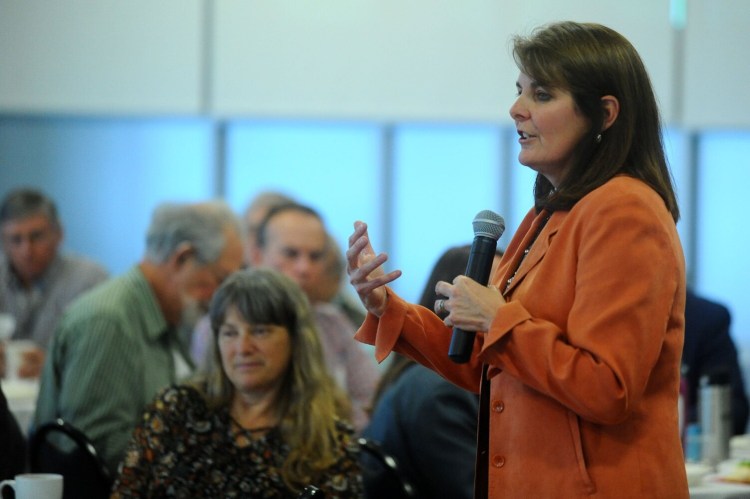WATERVILLE — Rural communities in Maine must have high-speed internet access to be — and remain — competitive in the global marketplace, according to Heather Johnson, commissioner of the Maine Department of Economic and Community Development.
Speaking on Tuesday at the annual Maine Broadband Summit at Thomas College in Waterville, Johnson stressed the importance of fast, reliable connectivity, saying more need be done to bring high-speed internet access to the state’s less-populated areas.
“If you think about economies and how they are driven, it’s driven by content creation and moving that content and value globally,” Johnson said. “We’re in a global marketplace now, so thinking about how you leverage that global economy, you need to be connected in order to do that.”
Johnson has years of technology experience in the private sector, including roles with Nokia, Gateway and Toshiba. Additionally, she has been executive director of the Somerset Economic Development Corp., and was the director of ConnectME, the state agency responsible for bringing broadband to homes and businesses throughout Maine.
“I don’t think that central Maine is unique (in connectivity issues),” Johnson said. “We have pockets across the state that do not have competitive connectivity to allow people access to markets and services.”
High-speed internet access is necessary to help smaller communities remain appealing and thrive economically, Johnson said.
“I was asked to talk about what we should do moving forward and what things are looking like moving forward,” Johnson said. “I think this is an interesting conversation. A year ago, I would have had a very different answer than I have today. It is not the technology that has changed. What is available today is similar to what we saw last year. The dialogue is what has changed, and the understanding of what it takes to make this work has changed.
“As we think about moving forward, one of the most important things that we have been talking about is how this can change communities. I spoke to some students in the hallway that were playing pool and asked them what was important to them and what they are thinking about as they make decisions for where they are going to base their career. They’ll talk about jobs, the cost of living, where their friends are going, where their family is. But you won’t hear them talk about broadband or connectivity.”
This, Johnson says, is not necessarily due to a lack of interest. Instead, it is related to their being on campuses with high-speed internet service.
“They’re all connected here, so it does not hit their radar,” Johnson said. “If you asked them if they would move somewhere that you couldn’t have access to the internet in any usable way or somewhere that you don’t have good cellular service, they’ll look at you like you’ve lost your mind.”
Because of this, Johnson said, it is important to keep those younger voices in the dialogue.
And rural communities in Maine must not go forgotten. Though they may be connected, many towns are not at levels technologically that allow them to thrive.
“There’s a lot to be done and funding is a key piece,” Johnson said. “We recognize that and will continue to work on this at the state level. We didn’t have the success we were hoping for, though we saw success since last session.
“We will be back at that again as they go forward in the process from the start to completion. As more communities do this work, there is more learning that we can take and spread to other communities so everybody can have info and avoid making the same mistakes.”
Later in the afternoon Tuesday, representatives of towns that have connectivity issues said they agreed with what Johnson had said in her keynote address.
Although next year’s broadband conference has yet to be organized, participants said they look forward to what it will bring.
Tracy Scheckel, marketing and public relations manager of Otelco Inc., said the conference continues to grow and attract more communities, organizations and businesses.
Alabama-based Otelco is a telecommunications company that owns small, independent telephone companies in Maine, Massachusetts, West Virginia, Missouri and Alabama.
“The biggest takeaway for me is that we’ve been coming to these events for years,” Scheckel said. “At the first one that I attended, there were people from Massachusetts talking about what they are doing with broadband. And people from Minnesota and a few from (Maine) that talked about what they wanted to do to build broadband.
“What I saw was a room full of people who had deer-in-the-headlights eyes because it was such a new conversation and there were no Maine stories to tell. As I’m sitting here for the last two days, there are Maine stories to tell, so the progress is there.
“What started out as a bunch of people looking into this is now a roomful of people sharing their stories about how they’re getting it done in the state. It’s exciting that in just a few years, it’s taken off as much as it has.”
Send questions/comments to the editors.




Success. Please wait for the page to reload. If the page does not reload within 5 seconds, please refresh the page.
Enter your email and password to access comments.
Hi, to comment on stories you must . This profile is in addition to your subscription and website login.
Already have a commenting profile? .
Invalid username/password.
Please check your email to confirm and complete your registration.
Only subscribers are eligible to post comments. Please subscribe or login first for digital access. Here’s why.
Use the form below to reset your password. When you've submitted your account email, we will send an email with a reset code.